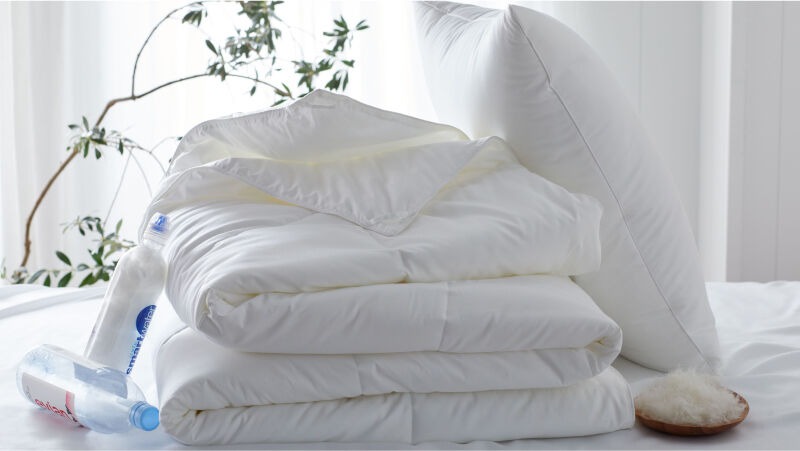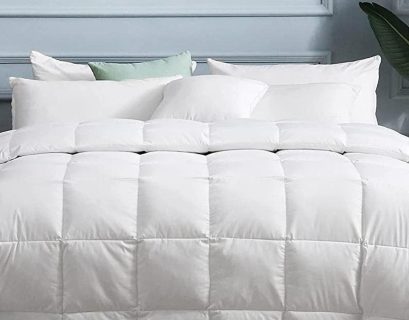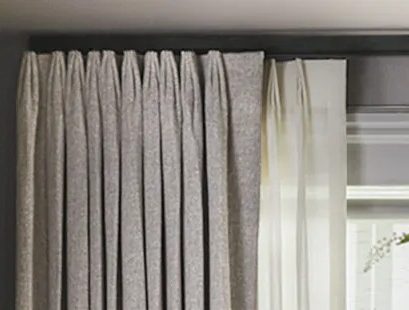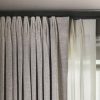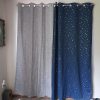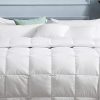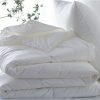As environmental consciousness continues to shape consumer choices, the demand for sustainable and eco-friendly bedding materials has seen a significant surge. Today, individuals are not only seeking comfort and style in their bedding but also sustainability—materials that minimize environmental impact and contribute to a healthier planet. In this comprehensive guide, we will delve into the world of sustainable bedding options, exploring materials and practices that align with eco-friendly principles while still delivering the comfort and quality we expect from our bedding.
The Rise of Sustainable Bedding:
The conventional production of bedding materials often involves resource-intensive processes, synthetic chemicals, and non-renewable resources. Sustainable bedding seeks to address these issues by focusing on environmentally friendly alternatives that prioritize conservation, reduce waste, and promote ethical practices.
Eco-Friendly Bedding Materials:
- Organic Cotton:
- Origin: Grown without synthetic pesticides or fertilizers, organic cotton is cultivated using natural processes.
- Benefits: Reduced environmental impact, healthier for farmers, and softer, chemical-free sheets.
- Considerations: May have a higher price point, but the benefits for the environment and personal health are substantial.
- Bamboo:
- Origin: Bamboo is a rapidly renewable resource that requires minimal water and no pesticides for cultivation.
- Benefits: Naturally hypoallergenic, breathable, and moisture-wicking. Bamboo fabric is silky-smooth and has antibacterial properties.
- Considerations: While the plant itself is sustainable, the process of turning bamboo into fabric can vary. Look for certified organic or Oeko-Tex Standard 100 labels for eco-friendly assurance.
- Tencel (Lyocell):
- Origin: Derived from sustainably sourced wood pulp, often from eucalyptus trees.
- Benefits: Closed-loop production process, biodegradable, and exceptionally soft with moisture-wicking properties.
- Considerations: Requires less water and energy compared to traditional cotton production, making it an environmentally friendly choice.
- Hemp:
- Origin: Hemp is a low-impact crop that requires minimal water, pesticides, and synthetic fertilizers.
- Benefits: Naturally resistant to pests, durable, and biodegradable.
- Considerations: Hemp fabric can be coarse initially but softens with use and washing.
- Recycled Materials:
- Origin: Various materials like recycled cotton, polyester, or even plastic bottles.
- Benefits: Diverts waste from landfills, reduces the need for virgin materials, and often requires less energy to produce.
- Considerations: Check for certifications like Global Recycled Standard (GRS) to ensure responsible sourcing and production.
Sustainable Practices in Bedding Production:
- Certifications:
- Look for certifications that validate the eco-friendly claims of bedding materials. Common certifications include:
- Global Organic Textile Standard (GOTS): Ensures organic status and social responsibility.
- Oeko-Tex Standard 100: Tests for harmful substances in textiles, ensuring they are safe for human health.
- Look for certifications that validate the eco-friendly claims of bedding materials. Common certifications include:
- Closed-Loop Production:
- Materials like Tencel utilize closed-loop production processes, where solvents are continuously recycled, minimizing waste and environmental impact.
- Water and Energy Efficiency:
- Choose materials and brands that prioritize water and energy efficiency in their production processes, reducing the overall environmental footprint.
- Transparent Supply Chain:
- Brands that are transparent about their supply chain practices often prioritize sustainability and ethical sourcing. Look for information on their website or product labels.
- Local Manufacturing:
- Opt for bedding brands that manufacture locally, as this reduces the carbon footprint associated with transportation and supports local economies.
Sustainable Bedding Products:
- Eco-Friendly Mattresses:
- Sustainable mattresses are made from natural, organic, or recycled materials. Look for brands that prioritize renewable resources, organic certifications, and eco-friendly manufacturing processes.
- Organic Bed Sheets:
- Organic cotton or bamboo bed sheets offer a sustainable alternative to conventional options. Brands that prioritize ethical and eco-friendly practices often provide organic bedding options.
- Eco-Friendly Pillows:
- Pillows made from recycled materials, organic cotton, or natural latex are eco-friendly alternatives. Consider brands that focus on sustainability in both materials and manufacturing.
- Sustainable Duvet Covers and Comforters:
- Look for duvet covers and comforters made from organic cotton, Tencel, or recycled materials. Brands that commit to reducing environmental impact often offer sustainable alternatives.
- Eco-Friendly Blankets and Throws:
- Blankets made from sustainable materials like organic cotton, recycled wool, or hemp provide warmth without compromising on eco-friendly principles.
Tips for Sustainable Bedding Care:
- Cold Water Washing:
- Washing bedding in cold water conserves energy and helps maintain the integrity of natural fibers.
- Air Drying:
- Whenever possible, air-dry your bedding to save energy and extend the lifespan of the materials.
- Eco-Friendly Detergents:
- Use eco-friendly laundry detergents that are biodegradable and free from harsh chemicals to minimize environmental impact.
- Repair Instead of Replace:
- If your bedding develops minor issues, consider repairing them instead of discarding. This extends the lifespan of the product.
- Donate or Recycle:
- When it’s time to replace bedding items, explore donation or recycling options to ensure they don’t end up in landfills.
Conclusion:
In the pursuit of sustainable living, choosing eco-friendly bedding materials aligns with the broader goal of minimizing our ecological footprint. From organic cotton and bamboo to Tencel and hemp, the world of sustainable bedding offers a plethora of options that cater to various preferences and styles. By selecting bedding products from brands that prioritize environmentally conscious practices, consumers can contribute to a healthier planet without compromising on comfort or quality. As the demand for sustainability grows, the bedding industry continues to evolve, providing increasingly innovative and eco-friendly options for a more conscious and sustainable slumber.
